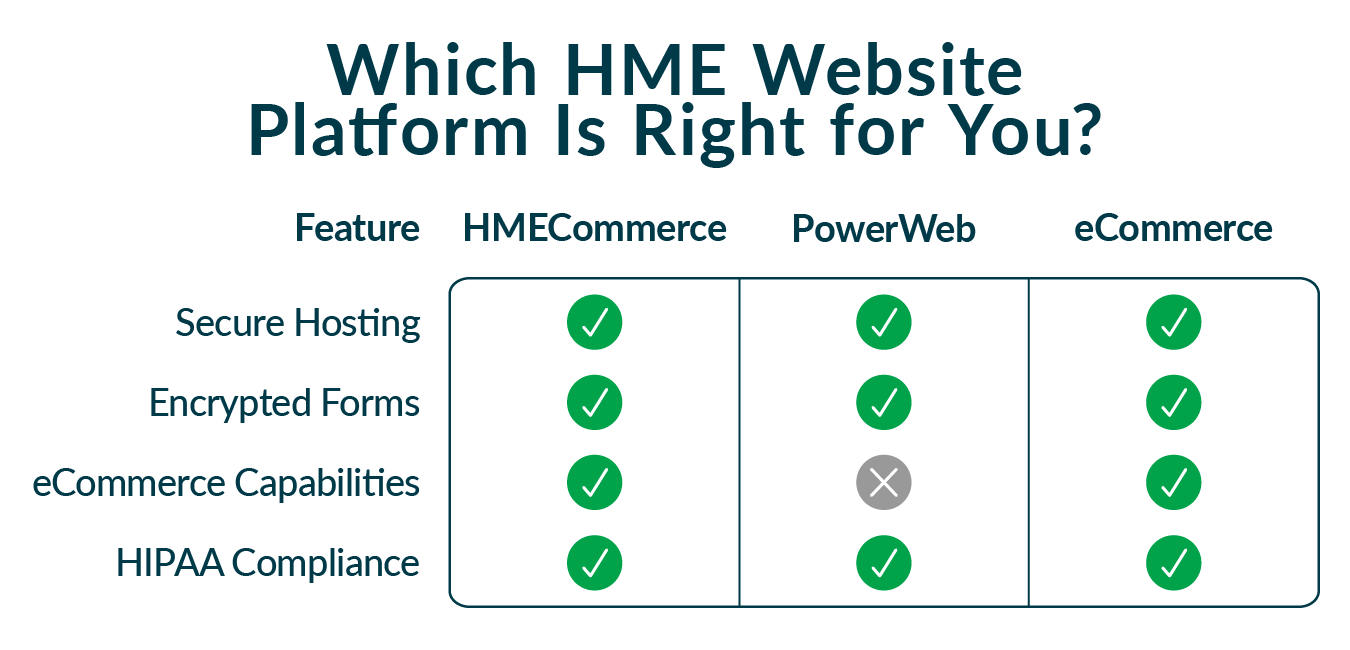
Updated 2:01 PM CDT, Thu October 16, 2025
Published Under: eCommerce Healthcare Healthcare Websites HIPAA Compliance HMECommerce PowerWeb Website Compliance Website Development

Your website is more than just a digital storefront; it’s a critical piece of how you serve and protect your patients. As a Home Medical Equipment (HME) provider, your website must meet strict HIPAA standards if it collects, stores, or transmits patient information.
But what does HIPAA compliance actually mean for your website? And how do you know if you’re covered?
Let’s walk through everything you need to know to stay protected, build trust with patients, and avoid costly violations.
What Is HIPAA Compliance for Websites?
HIPAA, or the Health Insurance Portability and Accountability Act, is a federal law that protects sensitive patient health information (PHI).
If your website collects any patient information, like names, medical conditions, contact forms, refill requests, or billing data, you’re responsible for keeping that information secure.
This applies to:
- Online forms
- Live chat tools
- Email communications
- Patient portals
- Refill or appointment requests
Key Features of a HIPAA-Compliant Website
1. Secure Hosting Environment
Your website must be hosted on a server that meets HIPAA technical safeguards:
- SSL/TLS encryption for data transmission
- Access controls and user authentication
- Daily backups and disaster recovery protocols
- Routine security audits
Forbin’s PowerWeb™, eCommerce, and HMECommerce platforms offer HIPAA-compliant hosting with built-in protections.
2. Encrypted Forms & Data
If your website has any kind of patient-facing form, the data must be encrypted both:
- In transit (as it’s submitted)
- At rest (while stored)
This prevents unauthorized access and protects data from being intercepted.
3. Business Associate Agreement (BAA)
If you work with vendors, like a web agency, email platform, or form tool, they must sign a Business Associate Agreement (BAA). This legal contract ensures they also follow HIPAA regulations when handling PHI.
4. Access Controls
Only authorized team members should be able to view or manage patient data collected through your website. This includes:
- Role-based permissions
- Password-protected admin portals
- Audit trails showing who accessed what, and when
5. HIPAA-Compliant Email & Messaging
Standard email platforms (like Gmail or Outlook) are not HIPAA-compliant by default.
You’ll need:
- Encrypted email solutions
- Microsoft 365 with HIPAA-safe configurations
- Secure patient messaging platforms
Need help with HIPAA-compliant email? Forbin offers Microsoft 365 email configurations tailored to HIPAA compliance.
Talk to an Email Security Expert
6. Clear Privacy Policy & Consent
Your site must include:
- A clear privacy policy explaining how data is used and protected
- Consent checkboxes before any form is submitted
- Language that’s easy for patients to understand

Why HIPAA Compliance Matters for HME Providers
HME providers handle everything from prescriptions to insurance claims, making your site a target for breaches and scrutiny.
A HIPAA-compliant website helps you:
- Build patient trust
- Avoid hefty fines (up to $50,000 per violation)
- Meet accreditation and payer requirements
- Demonstrate professionalism and care
Forbin’s HIPAA-Compliant Web Platforms
We’ve built our HME website solutions with security, performance, and patient trust in mind:
HMECommerce
A full-featured, HIPAA-compliant eCommerce platform that allows you to sell products online with secure checkout, inventory tracking, and encrypted form handling.
PowerWeb™
A modern, streamlined website platform perfect for HME providers who want an easy-to-manage site that meets HIPAA standards without extra complexity.
eCommerce Add-On
Already have a site you love? No problem. Our eCommerce module can bolt onto your current website and make it secure for patient data collection.
Learn More About eCommerce Add-Ons
HIPAA Website Features & Business Benefits
| Feature | Benefit to Your Business |
|---|---|
| Secure Hosting Environment | Protects patient data from breaches and ensures your site meets HIPAA technical safeguards. |
| Encrypted Data Collection | Keeps sensitive information safe during form submissions, reducing the risk of interception. |
| Business Associate Agreement (BAA) | Legally protects your business by holding third-party vendors accountable for PHI. |
| Access Controls | Limits data access to authorized staff only, reducing internal risks and improving oversight. |
| HIPAA-Compliant Email | Enables secure communication with patients—ideal for reminders, billing, and updates. |
| Privacy Policy & Consent | Builds trust with patients by clearly explaining how their data is used and protected. |
FAQs About HIPAA-Compliant Websites for HME Providers
Q1: Do I need a HIPAA-compliant website if I don’t collect patient data online?
A: If your website doesn’t collect, store, or transmit any patient health information (PHI), HIPAA compliance may not be required.
However, most HME providers use forms, email, or chat tools that do involve PHI, so it’s best to get an expert review.
Q2: What happens if my website isn’t HIPAA-compliant?
A: Non-compliance can lead to serious consequences, including fines, legal action, and a major loss of patient trust. Even accidental data exposure can trigger investigations and penalties.
Q3: What is a Business Associate Agreement (BAA), and why is it important?
A: A BAA is a legal contract between your business and any third-party vendor that handles PHI. It ensures they follow HIPAA standards and are accountable for protecting patient data.
Q4: Can I use regular email services like Gmail or Outlook for patient communication?
A: Standard email platforms are not HIPAA-compliant by default. You’ll need encrypted email solutions like Microsoft 365 configurations to securely send PHI.
Feeling Overwhelmed? Let Our Experts Help
At Forbin, we work exclusively with HME providers, and we’re already helping clients implement HIPAA-compliant platforms, forms, and email systems that reduce risk and improve trust.
You focus on care. We’ll handle the compliance. Let’s build you a website that’s not only secure, but successful.
Comments